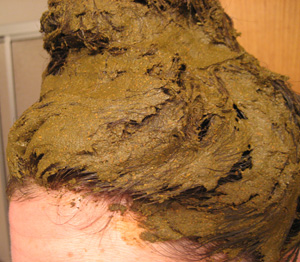Why Protein Is Important
Our hair is made up of proteins, lipids, water, and trace elements. Protein is essential to the health of natural hair, helping our hair feel strong and soft. Protein treatments can help your hair retain moisture, improve elasticity, and tend to add shine. If your hair is damaged by heat or chemicals, protein will help restore your hair by filling in the gaps in the cortex.
When to do a Protein Treatment
Use a protein treatment if your hair feels dry and brittle or if you have fine or damaged hair. Even though my hair is coarse, each individual strand is actually quite thin. I give myself a protein once a month. Afterwards, I notice my fine strands feel stronger, my hair feels thicker, and it retains moisture much better.
What You Should Look for in a Protein Treatment
Protein treatments often contain one or more of the following:
- Hydrolyzed proteins - penetrate hair; add strength and shine
- Collagen - improves hair elasticity
- Keratin - strengthens hair
- Wheat protein - strengthens hair, helps retain moisture
- Soy protein - attracts moisture to hair
- Silk protein - softens hair
I would suggest using a protein treatment that has at least two types of the protein mentioned. My favorite protein treatment actually contains hydrolyzed keratin, wheat protein, and egg protein.
Protein Sensitivity
So you do a protein treatment, and instead of the moisturized, soft hair I've been describing, your hair is dry as straw. If this happens, you might have thicker, healthier hair that doesn't need protein. (Keep in mind that when I reference "thick hair," I am referring to the thickness of individual strands, and not to the density of one's hair.) Thicker hair is more susceptible to protein sensitivity than thinner hair. Protein lives in the medulla, or the innermost layer of the hair shaft. The medulla is often fragmented or absent in thinner hair and is complete in thicker hair. Because of this, thicker hair can easily "overdose" on protein, while thinner hair usually benefits from it.
What about Henna?
If you are sensitive to protein, an alternative is to do a henna treatment. I've used Lush (Caca Rouge Mama) in the past, and the results are comparable to a typical protein treatment. For obvious reasons, I have to say I prefer a standard 20-60 minute protein treatment over a 10-12 hour henna treatment. But nonetheless, if you're looking for stronger, more moisturized hair and if your hair hates protein treatments, henna may be for you.
Do you do protein treatments? Have you tried henna? What difference have you noticed in your hair?
What about Henna?
If you are sensitive to protein, an alternative is to do a henna treatment. I've used Lush (Caca Rouge Mama) in the past, and the results are comparable to a typical protein treatment. For obvious reasons, I have to say I prefer a standard 20-60 minute protein treatment over a 10-12 hour henna treatment. But nonetheless, if you're looking for stronger, more moisturized hair and if your hair hates protein treatments, henna may be for you.
Do you do protein treatments? Have you tried henna? What difference have you noticed in your hair?



No comments:
Post a Comment